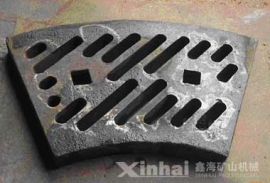With the increase of lead and zinc resource demand, the developing degree of lead and zinc deepen day by day. An amount of lead and zinc tailings are piled in tailings pond, which take up a lot of land and destroy the ecological environment. Therefore, the comprehensive recovery and utilization of lead and zinc tailings is necessary. At present, the recovery and utilization of lead and zinc tailings are about the following aspects: reprocessing of valuable minerals, goaf backfill, and building materials, etc.

Use the table of contents below to navigate through the guide:
01Lead and zinc tailings reprocessing
The valuable minerals of lead and zinc tailings including lead, zinc, sulfide, fluorite, barite, sericite, etc. According to the differences of deposit nature and processing technology, lead and zinc tailings has different characteristic and constitutes. So is the tailings reprocessing technology. So, it is necessary to fully consider of targeted valuable minerals of tailings, and carrying out reasonable recovery and utilization.
For some long-developed lead-zinc tailings with a high degree of oxidation, lead, zinc and sulfide minerals lost in original process can be recovered through sulfide ore mixed flotation – zinc-sulfur separation – lead oxide sulfide flotation process, which creates new economic benefit.
For lead and zinc tailings with fluorite and barite as main material, the fluorite and barite concentrates can be recovered through flotation process. First use water glass, aluminum sulfate and tannin extract as inhibitors of barite and other gangue minerals, and use sodium oleate to collect fluorite. Through one selection, one rough selection, and multiple selections, the fluorite is effectively removed. Separate from barite to obtain fluorite concentrate to achieve the purpose of comprehensive utilization of mineral resources. Then barite concentrates are recovered in flotation.
Some lead and zinc tailings contains scheelite. The suitable particle size should be grinded. Through rough flotation and shaking table separation, scheelite can be recovered.

02Lead and zinc tailings backfilling the mined area
The underground mined-out area produced during the mining of lead-zinc deposits is prone to cause collapse, collapse, landslides and other geological disasters. Once an accident occurs, it will cause serious consequences. It is effective to backfill the mined lead-zinc ore as the mine filling aggregate. The way to solve this problem has also effectively solved the tailings emission problem. Three filling methods can be adopted when lead-zinc tailings are backfilled.
Graded tailings filling
Graded tailings filling is the common backfill technology of lead and zinc tailings at present. At first, the fine-grained under 200 or 400 meshes are removed by hydrocyclone. After classification, cementitious materials are added into the coarse tailings. The coarse tailings was sent to the filling area through tailings pipeline.

Full tailings cement filling of lead and zinc tailings
It takes all the lead and zinc tailings as filler, with cement or cement substitute as cementing agent. Then the tailings are sent to the filling area. Compared with graded backfilling, full tailings cementation has high requirements for the concentration of lead-zinc tailings filler slurry, and the content of particles smaller than 20 microns in the filler is not less than 15%-20%, so the dehydration requirements for lead-zinc tailings are very high.
Lead-zinc tailings are paste-like cemented filling
Paste-like cementing filling mainly uses paste-like filling cementing material as a cementing agent, and lead-zinc tailings as aggregates to make a paste with a weight concentration of 72% to 78%, which is then transported to the underground filling area. The fine-grained material in the aggregate should reach 15%~30%.
03Used as building materials
Because lead-zinc tailings often contain a variety of minerals, a small amount of lead, zinc, copper and other elements are similar to the raw materials required for the production of building materials, so they are also used in building materials. At present, lead-zinc tailings can be used as raw materials for cement production and building wall panels.

The above is the way of comprehensive recycling and utilization of lead and zinc tailings. With the continuous enhancement of the concept and awareness of the comprehensive utilization of mineral resources, the comprehensive recycling and utilization of lead and zinc tailings has received great attention, and practical results have also been achieved in many aspects. In actual production practice, it is necessary to focus on the reserves and output of lead-zinc tailings. Mineral composition, particle size distribution, occurrence status, etc., adopt corresponding recycling methods to economically and rationally realize comprehensive recycling and utilization of lead-zinc tailings resources.


 marketing@ytxinhai.com
marketing@ytxinhai.com  0086 13810327080
0086 13810327080 






































































































 CHAT
CHAT MESSAGE
MESSAGE








